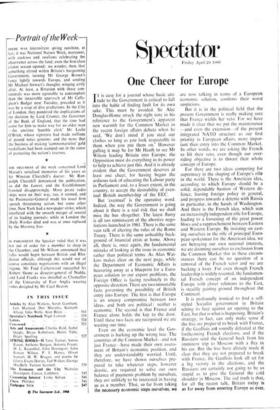One Cheer for Europe
irr is easy for a journal whose basic atti- Itude to the Government is critical to fall into the habit of finding fault for its own sake. This must be avoided. Sir Alec Douglas-Home struck the right note in his reference to the Government's apparent new warmth for the Common Market in the recent foreign affairs debate when he said, 'We don't mind if you steal our clothes so long as you look respectable in them when you put them on.' However galling it may be for Mr Heath to see Mr Wilson leading Britain into Europe, the Opposition must do everything in its power - to help to achieve just this. And it is already evident that the Government deserves at least one cheer, for having begun the arduous task of educating the Labour party in Parliament and, to a lesser extent, in the country, to accept the desirability of even- tual British membership of the EEC.
But 'eventual' is the operative word. Indeed, the way the Government is going about it there is a real risk that we shall -miss the bus altogether. The latest flurry is all too reminiscent of the abortive nego- tiations launched in 1961. There is the same vain talk of altering the rules of the Rome Treaty. There is the same unhealthy back- ground of financial crisis. at home. Above all, there is, once again, the fundamental mistake of looking at the issue in economic rather than political terms. As Alan Wat- kins makes clear on the next page, while the Department of Economic Affairs is beavering away at a blueprint for a Euro, pean solution to our export problems, the Foreign Office is facing resolutely in the opposite direction. There are two immutable facts governing the possibility of British entry into Europe. The first is that Europe is an uneasy compromise between two ideas, and both are political : neither is economic. The second is that France-and France alone holds the key to the door. Until these two facts are recognised we are wasting our time.
Even on the economic level the Gov- ernment is barking up the wrong tree. The countries of the Common Market—and not just France—have made their own assess- ment of Britain's economic position, and they are understandably worried. Until, therefore, we have shown ourselves pre- pared to take whatever steps, however drastic, are required to solve our own balance of payments problem by ourselves, they are unlikely to be interested in having us as a member. That, so far from taking the necessary economic steps ourselves, we are now talking in terms of a European economic solution, confirms their worst suspicions.
But it is in the political field that the present Government is really making sure that France wields her veto. For we have made it clear that we put the maintenance —and even the extension—of the present integrated NATO structure as our first priority in European affairs, more impor- tant than entry into the Common Market. In other words, we arc asking the French to lift their veto, even though our over- riding objective is to thwart their whole concept of Europe.
For there are two ideas competing for supremacy in the shaping of Europe's role in the world. There is the American idea, according to which Europe should be a solid, dependable bastion of Western de- fence, leaving foreign policy in general, and progress towards a detente with Russia in particular, in the hands of Washington. And there is the French idea, which sees an increasingly independent role for Europe, leading to a loosening of the great power blocs and a rapprochement between Eastern and Western Europe. By insisting on cast- ing ourselves in the role of principal Euro- pean spokesman for the American idea, we are ,betraying our own national interests, we are dooming ourselves to exclusion from the Common Market (for in these circum- stances there can be no question of a removal of the French veto) and we are backing a loser. For even though French leadership is widely resented, the fundamen- tal French concept of an independent Europe with closer relations to the East, is steadily gaining ground throughout the Continent.
It is profoundly ironical to find a self- styled Socialist government in Britain setting its face against an opening to the East, but that is what is happening. Britain's strategy, in fact, can only make sense' if the five are preparld to break with France, if the Gaullists are soundly defeated at the forthcoming French elections, and if the Russians send the General back from his imminent trip to Moscow with a flea in his ear. But the five have already made it clear that they are not prepared to break with France, the Gaullists look all set for a big victory in the elections, and the Russians are certainly not going to be so stupid as to give the General the cold shoulder in Moscow. The sad truth is that, for all the recent talk, Britain today is as far away from entering Europe as ever.










































 Previous page
Previous page